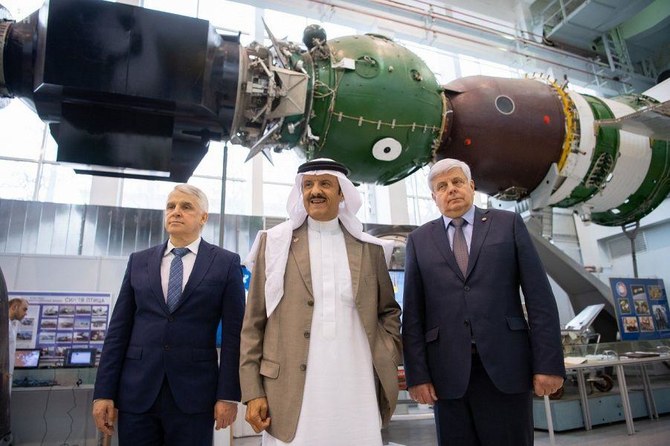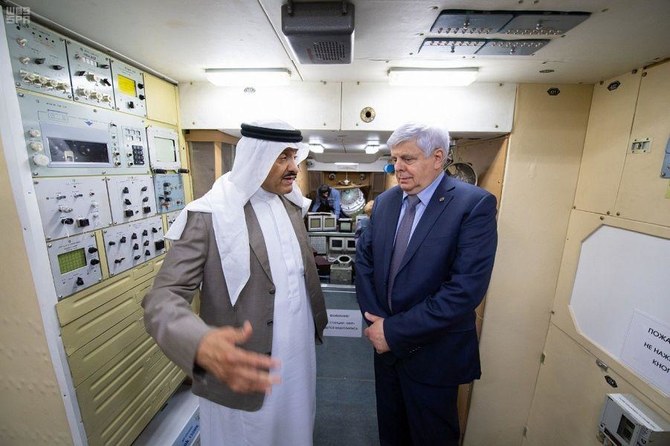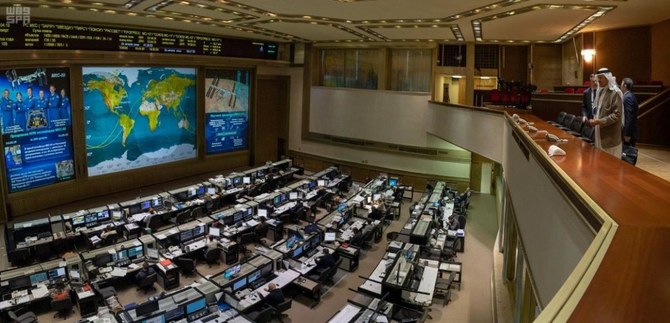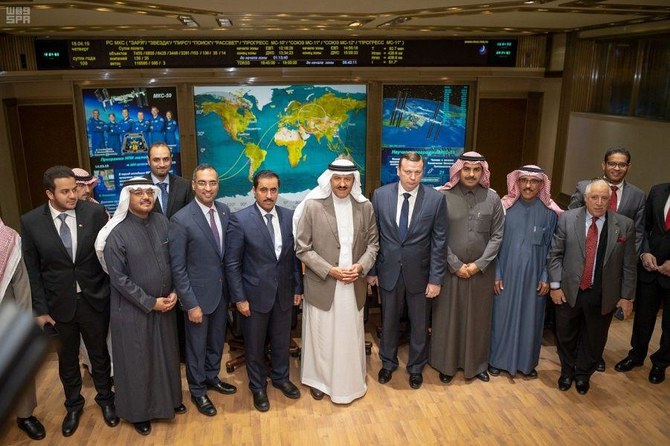MOSCOW: The chairman of the Saudi Space Commission on Saturday visited the Moscow headquarters of Russia’s mission control center.
Prince Sultan bin Salman was received by the center’s supervisor, who briefed him on the center’s work and programs, the Saudi Press Agency (SPA) reported.
They discussed establishing scientific and research cooperation in the areas of space and aeronautics, and the International Space Station.
Prince Sultan also visited the General Corporation for Heavy Space Industries, which is responsible for manufacturing spacecraft and developing technology. It produces most parts of the International Space Station.
He said his visit was in line with directives from King Salman to ensure close cooperation with Russia in the space sector and joint investments.
The Saudi Space Commission (SSC) was working at a “rapid pace” to complete an ambitious national strategy, he said, and the Kingdom was one of the region’s first countries to explore the future of space more than 34 years ago.
He added that programs were being prepared in partnership with Russian space institutions and agencies to train Saudi astronauts and to expand in space and satellite industries.
The prince said the commission was keen to invest in training Saudi talent through specialized programs and educational scholarships abroad.
Earlier this week, he visited the headquarters of the Russian space agency Roscosmos for a working session alongside its director-general, Dmitry Olegovich Rogozin.
“Russia considers Saudi Arabia a serious partner, with a great regional and international influence,” SPA reported Rogozin as saying.
Last month, Saudi Arabia and 10 other countries signed the first pan-Arab agreement on coordinating national exploration programs at the Global Space Congress in Abu Dhabi.
The ruler of Dubai, Sheikh Mohammed bin Rashid Al-Maktoum, said that the group’s first project would be a satellite system to be built in the UAE.
The agreement is unprecedented for the nations involved, whose levels of technical expertise vary. The first aim of the agreement will be to bring them all up to an equal level of capability.
Saudi space chief visits Moscow mission control center
Saudi space chief visits Moscow mission control center

- Prince Sultan bin Salman was received by the center’s supervisor
- He also visited the General Corporation for Heavy Space Industries, which is responsible for manufacturing spacecraft and developing technology
Exhibitions at Prophet’s Mosque bring Islamic heritage to life

- The Rare Manuscripts exhibition in annex 204 of the southern courtyards, which is open from 8 a.m. to 9 p.m., showcases “historical manuscripts, documents, and inscriptions that trace the evolution of Islamic writing”
MADINAH: The corridors and courtyards of the Prophet’s Mosque feature “unique sites and exhibitions that enrich the visitor experience, offering historical and cultural insights that reflect Islamic heritage and Madinah’s hospitality,” according to an article published by the Saudi Press Agency on Saturday.
A key attraction is the Architectural Evolution of the Prophet’s Mosque exhibition, located on the southern courtyard opposite exits 308 and 309, which uses interactive displays to highlight the mosque’s architectural development. It is open daily from 4 p.m. to 10 p.m.
Opposite exits 306 and 307 is the International Exhibition of the Prophet’s Biography. Open from 4:30 p.m. to 10:30 p.m. daily, it offers “a contemporary presentation of Prophet Muhammad’s life and teachings.”
The Rare Manuscripts exhibition in annex 204 of the southern courtyards, which is open from 8 a.m. to 9 p.m., showcases “historical manuscripts, documents, and inscriptions that trace the evolution of Islamic writing.”
The mosque’s library, at gate 10 on the western side, is open 24 hours a day and includes sections on manuscripts, rare books, audio archives, and art collections.
Near Uthman Gate, the Manuscripts and Rare Books Department serves researchers and enthusiasts. It houses more than 4,000 original manuscripts, nearly 60,000 digital copies, 4,600 photocopies, and 450 different editions of the Qur’an. It operates in two shifts: 8 a.m.–noon and 4–8 p.m.
“Together, these exhibitions and centers enhance the cultural and educational value of visiting the Prophet’s Mosque, offering pilgrims a more enriching experience,” the SPA stated.
New campaign urges Saudis to safeguard artifacts

- Nationwide effort aims to curb threats to heritage sites and artifacts
RIYADH: The Heritage Commission launched the “Aadat” national awareness campaign to enhance public understanding of the importance of Saudi antiquities.
The campaign underscores the vital role of artifacts in reinforcing the Kingdom’s cultural and national identity, reflecting the succession of civilizations across its land over millennia.
It is part of a broader series of initiatives by the commission to spotlight Saudi antiquities and raise awareness of threats they face, such as encroachments and illegal trafficking.
HIGHLIGHT
The campaign promotes the idea that protecting antiquities is a shared responsibility, rooted in a deep appreciation of their role in the nation’s cultural heritage.
The campaign promotes the idea that protecting antiquities is a shared responsibility, rooted in a deep appreciation of their role in the nation’s cultural heritage, the Saudi Press Agency reported.
It adopts a comprehensive approach using various media and outreach tools, including field campaigns in public areas, markets, malls, and universities across multiple regions.
The commission also plans to introduce interactive pavilions to showcase key archaeological sites and highlight the Kingdom’s geographical and cultural diversity.
It stressed that the campaign continues its ongoing efforts to safeguard artifacts, which are rich in symbolic and cultural meaning.
Each artifact, the commission noted, tells a story from the past, and its preservation is essential to maintaining the national memory for future generations.
The commission announced last week that 744 new archaeological sites have been added to the National Antiquities Register, raising the total to 10,061 across the Kingdom.
This milestone underscores the richness and diversity of Saudi Arabia’s cultural heritage and reflects the commission’s ongoing commitment to documenting and preserving these sites.
The newly registered sites are spread across several regions: Riyadh (253), Makkah (11), Madinah (167), Qassim (30), Eastern Province (13), Asir (64), Tabuk (72), Hail (13), Northern Borders (2), Jazan (23), Najran (86), and Jouf (10).
Stressing the importance of community involvement in heritage preservation, the commission urged citizens and residents to report unregistered sites via the Balagh platform, social media, or the Unified Security Operations Center at 911.
Saudi Arabia, France civil aviation authorities discuss boosting cooperation

- Discussions were held on mutual investment opportunities in aircraft design and assembly, as well as the incentives Saudi Arabia offers to attract high-quality investments in the aviation industry
PARIS: A delegation from the Saudi civil aviation sector, led by General Authority of Civil Aviation President Abdulaziz bin Abdullah Al-Duailej, visited the Airbus factory in Toulouse, France, as part of the 55th Paris Air Show at Le Bourget, which ends on June 22.
The visit strengthens cooperation with France in areas such as manufacturing, technology transfer, and localization of the aerospace industry, Saudi Press Agency said in a report.
Discussions were held on mutual investment opportunities in aircraft design and assembly, as well as the incentives Saudi Arabia offers to attract high-quality investments in the aviation industry.
Saudi FM reaffirms support for Palestine, condemns Israeli strikes on Iran at OIC meeting in Istanbul

- Was speaking during opening session of 51st meeting of the Council of Foreign Ministers of the OIC
RIYADH: Saudi Foreign Minister Prince Faisal bin Farhan reaffirmed the Kingdom’s unwavering support for the Palestinian cause during the opening session of the 51st meeting of the Council of Foreign Ministers of the Organization of Islamic Cooperation, held in Istanbul on Saturday.
The foreign minister also condemned the Israeli strikes on Iran, describing them as a “blatant” violation of international law and an infringement on Iranian sovereignty and security.
The meeting, hosted by Turkiye, marked the start of its presidency of the OIC Council of Foreign Ministers. Prince Faisal congratulated Turkiye on assuming the role and extended thanks to Cameroon for its efforts during its previous term.
In his address, Prince Faisal underscored the importance Saudi Arabia placed on the Palestinian issue, highlighting the Kingdom’s ongoing efforts to end the war in Gaza, alleviate the worsening humanitarian crisis, and unify Arab and Islamic positions on the conflict.
He reiterated Saudi Arabia’s firm support for the establishment of an independent Palestinian state along the 1967 borders with East Jerusalem as its capital.
Turning to the Israeli-Iranian conflict, he said: “These attacks threaten the security and stability of the region,” and called for an immediate halt to military operations, de-escalation, and a return to negotiations between Iran and the international community.
Prince Faisal also reiterated Saudi Arabia’s continued backing of efforts to resolve the crisis in Yemen, expressing support for a comprehensive political solution and the restoration of peace, stability, and security in the country.
Saudi foreign minister holds talks with Egyptian and Pakistani counterparts on OIC sidelines

ISTANBUL: Saudi Foreign Minister Prince Faisal bin Farhan held separate meetings on Saturday with his Egyptian and Pakistani counterparts on Saturday.
The discussions were held on the sidelines of the 51st session of the Organization of Islamic Cooperation Council of Foreign Ministers in Istanbul.
During talks with Egyptian Foreign Minister Badr Abdelatty, the two sides reviewed the close relations between the Kingdom and Egypt and discussed regional developments and their impact on the security of the region, the Saudi Press Agency reported.
Prince Faisal also met with Pakistan’s Deputy Prime Minister and Foreign Minister Ishaq Dar. The discussions focused on bilateral ties, as well as regional and international developments and ongoing efforts to address them, SPA added.
Both meetings were attended by Prince Musab bin Mohammed Al-Farhan, advisor to the Foreign Minister for Political Affairs, and Fahd bin Asaad Abu Al-Nasr, Saudi ambassador to Turkiye.

























